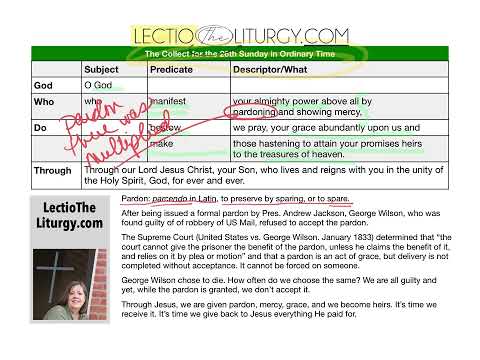26 Sunday Ordinary Time Collect
Thanks for joining me as we Lectio the Liturgy with the Collect for the 26th Sunday in Ordinary Time.
O God, who manifest your almighty power above all by pardoning and showing mercy, bestow, we pray, your grace abundantly upon us and make those hastening to attain your promises heirs to the treasures of heaven. Through our Lord Jesus Christ, your Son, who lives and reigns with you in the unity of the Holy Spirit, God, for ever and ever.
Have you ever thought about how powerful God is? He can part seas, He can heal, He can raise from the dead. Also in His power, God, with His grace, offers us pardon. Power is most-powerful when it does not use force.
In the Latin form of the prayer, for pardon, we find the word parcendo. It means to preserve by sparing. Two old hymns came to me that talk about sparing and pardoning.
In How Great Thou Art, we hear, “and when I think, that God His son not sparing,” Jesus did not ask to be pardoned, He chose to become our pardon.
And there is another hymn, titled, At Calvary, with the words, "Mercy there was great and grace was free, Pardon there was multiplied to me, There my burdened soul found liberty, at Calvary.” While these are worth praying with, there is one other side that is every bit as important.
We learn and live the Christian life knowing that we need to surrender to God. We also learn that God is more than generous, He didn’t even spare His Son for us, but if there’s one thing that Christians need to work more on, it is receiving.
As I pray with people, I see more and more how the evil one wants us to believe that we are “too much” for God to handle or that we are too dirty to approach God. We need to understand what it means to be pardoned.
In 1829, two men robbed a US mail carrier. Both were captured and tried. Both were found guilty and were sentenced to execution by hanging. One man, James Porter, was executed on schedule, but George Wilson was not. He had influential friends who, on his behalf, pleaded for mercy from President Andrew Jackson, who issued a formal pardon, dropping all charges. Wilson would still have to serve time in prison, however, he refused to accept the pardon.
The Supreme Court (United States vs. George Wilson, January 1833) determined that “the court cannot give the prisoner the benefit of the pardon, unless he claims the benefit of it,” and that a pardon is an act of grace, but delivery is not completed without acceptance. A pardon cannot be forced on someone.
George Wilson chose to die. How often do we choose the same? We are all guilty and yet, while the pardon is granted, we don’t accept it.
Next in the prayer, we ask God to bestow on us His grace, and to make those who are hastening, or running, to His promises, heirs of the treasures of Heaven.
It’s easy to think that the treasures of Heaven are only given to us when we get there, but God wants us to live in those treasures today.
At Baptism we received the grace of becoming heirs to all that God lavished upon Jesus. God fulfilled His promises in Jesus, and through Jesus, they are fulfilled in us, too.
Through Jesus, we are given pardon, mercy, grace, and we become heirs. It’s time we receive it because when we do, we give back to Jesus everything He paid for.
Thanks for praying with me
Julie
